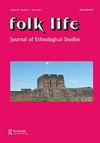《地球:非工业化农业的动力:8000年的韧性和创新》,3卷集
IF 0.1
4区 社会学
0 FOLKLORE
引用次数: 0
摘要
正如策展人和大学学者在英国遵循不同的轨迹一样,对于我们的美国同行来说,公共历史与学术同行同步发展。这本书成功地连接了这些不同的领域,并在这样做的过程中,对将批判性思维和历史方法置于公众解释和理解的核心的重要性进行了微妙的评论。正如里德和她的同行们雄辩地阐述的那样,农业曾经无处不在,显而易见。它已经从我们的通用词汇中消失,成为少数专业人士的领地。就像怀尔德的《农夫男孩》中的缺点和所有故事一样,《解读农业》也有其自身所处的位置和固有的偏见和偏执,它是一部微妙的宣言,展示了现在被遗忘的事物的力量,展示了农业文化和生活曾经普遍存在的特征的证据的持久性,以及以各种不同的方式动员这些遗产来解决当今的问题。这本书提出了我们所有人都必须面对的一系列巨大问题和挑战,其中最引人注目的是殖民主义的遗产、土地掠夺、被剥夺权利的劳动力以及农业综合企业的兴起和影响。我只希望里德和她的同行们正在写一本后续的书,将“犁”与“犁”对立起来,并将其中一些复杂的辩论放在更广泛的国际舞台上。此外,我现在可以更清晰、更丰富、更具体地理解这些农业历史,以及它们对我、我的儿子和子孙后代的价值。本文章由计算机程序翻译,如有差异,请以英文原文为准。
EARTH: the dynamics of non-industrial agriculture: 8,000 years of resilience and innovation, 3-volume set
Much as curators and University scholars follow differing trajectories here in the United Kingdom, for our American counterparts, public history has developed powerfully and in parallel with its academic counterpart. This is a book that bridges these different spheres successfully and in so doing offers a subtle commentary on the importance of placing critical thinking and historical method at the heart of public interpretation and understanding. Agriculture, as Reid and her fellow authors so eloquently articulate, was once omnipresent and obvious. It has slipped out of our common lexicon and become the province of a specialized few. Like the warts and all storytelling of Wilder’s Farmer Boy, complete with its own situated and inherent bias and bigotry, Interpreting Agriculture is a subtle manifesto for the power of things now forgotten, for the durability of evidence of the once pervasive character of farming culture and life, for its potent nostalgic value, and for the myriad different ways that such heritage might be mobilized to address issues in the present-day. This is a volume that sets up a whole series of enormous questions and challenges that we must all face up to, most notably concerning the legacies of colonialism, land grabbing, a disenfranchised labour force, and the rise and impact of agribusiness. I only hope that Reid and her peers are working on a follow-up volume that sets ‘plow’ against ‘plough’ and situates some of these complex debates on a wider international stage. Also, I can now finish reading Farmer Boy with a far clearer, richer, and more specific contextual understanding of these agricultural pasts and of what value they may hold for me, for my son, and for future generations.
求助全文
通过发布文献求助,成功后即可免费获取论文全文。
去求助
来源期刊
CiteScore
0.30
自引率
66.70%
发文量
17
期刊介绍:
Folk Life: Journal of Ethnological Studies is a journal devoted to the study of all aspects of traditional ways of life in Great Britain and Ireland. The journal publishes original, high quality, peer-reviewed research in the form of unsolicited articles, solicited papers (which are usually selected from those read at the Society"s annual conference) and of members" papers (which are usually short reports of work in progress). Work published in Folk Life may include, for example, papers dealing with the traditional ways of life of other countries and regions, which may be compared to or contrasted with those of Great Britain and Ireland.

 求助内容:
求助内容: 应助结果提醒方式:
应助结果提醒方式:


